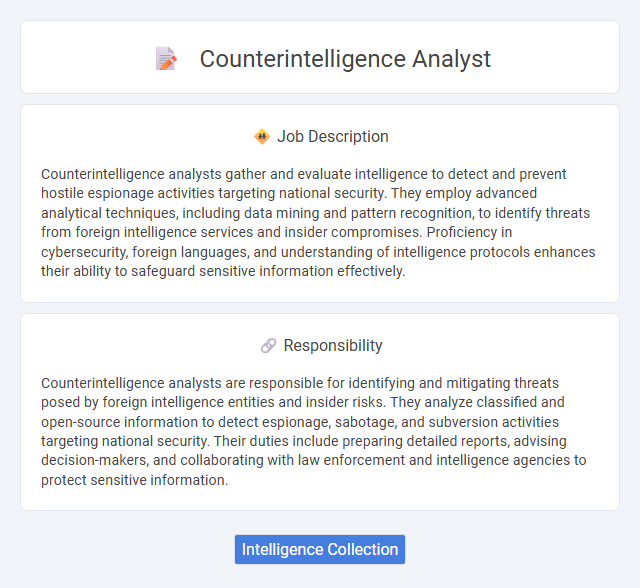
Counterintelligence analysts gather and evaluate intelligence to detect and prevent hostile espionage activities targeting national security. They employ advanced analytical techniques, including data mining and pattern recognition, to identify threats from foreign intelligence services and insider compromises. Proficiency in cybersecurity, foreign languages, and understanding of intelligence protocols enhances their ability to safeguard sensitive information effectively.
Individuals with strong analytical skills and attention to detail are likely to be well-suited for a counterintelligence analyst position, as the role demands persistent investigation and critical thinking. People who thrive under pressure and possess a high level of discretion and integrity may find greater success and job satisfaction in this field. Those who struggle with high-stress environments or lack patience for thorough information gathering might face challenges in adapting to the rigorous demands of counterintelligence work.
Qualification
Counterintelligence analysts require a bachelor's degree in criminal justice, political science, or cybersecurity, combined with strong analytical and critical thinking skills. Proficiency in foreign languages, experience with intelligence software, and knowledge of security protocols significantly enhance job performance. Candidates must obtain security clearances and demonstrate the ability to interpret and counter espionage threats effectively.
Responsibility
Counterintelligence analysts are responsible for identifying and mitigating threats posed by foreign intelligence entities and insider risks. They analyze classified and open-source information to detect espionage, sabotage, and subversion activities targeting national security. Their duties include preparing detailed reports, advising decision-makers, and collaborating with law enforcement and intelligence agencies to protect sensitive information.
Benefit
Counterintelligence analyst jobs likely offer benefits such as access to sensitive information that enhances national security efforts and the potential for career advancement within intelligence agencies. Employees may experience a sense of purpose and contribution to public safety, which can improve job satisfaction. Competitive salaries and government benefits, including health insurance and retirement plans, are also probable advantages.
Challenge
Counterintelligence analyst roles likely involve navigating complex and evolving security threats that require sharp analytical skills and constant vigilance. The probability of facing ambiguous or incomplete information could demand advanced critical thinking and problem-solving abilities. This challenge may also extend to staying updated on emerging technologies and espionage tactics to effectively protect national security interests.
Career Advancement
Counterintelligence analysts play a crucial role in identifying and preventing threats to national security by analyzing intelligence data and detecting espionage activities. Career advancement in this field often involves gaining specialized certifications, developing expertise in emerging technologies, and earning security clearances to qualify for senior roles such as intelligence officer, operations manager, or cybersecurity specialist. Professional growth is further supported by advanced education in areas like international relations, cybersecurity, and data analysis, enabling analysts to take on leadership positions within government agencies or private sector security firms.
Key Terms
Intelligence Collection
Counterintelligence analysts specialize in intelligence collection by identifying, assessing, and mitigating threats from foreign intelligence entities and insider threats. They utilize advanced data analysis, surveillance, and reporting techniques to gather actionable intelligence critical for national security. Their role involves coordinating with multiple agencies to ensure comprehensive intelligence integration and protection against espionage.
 kuljobs.com
kuljobs.com